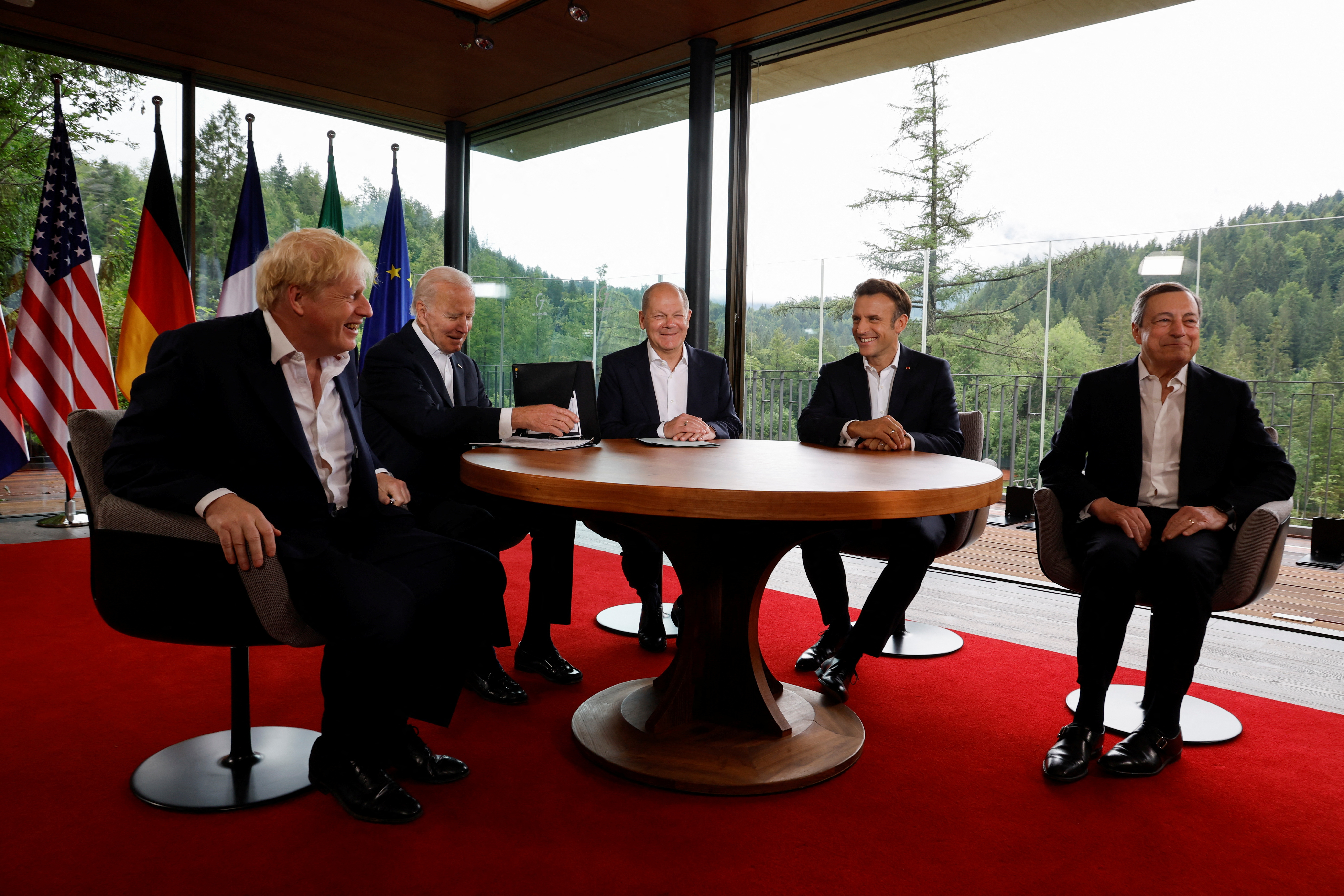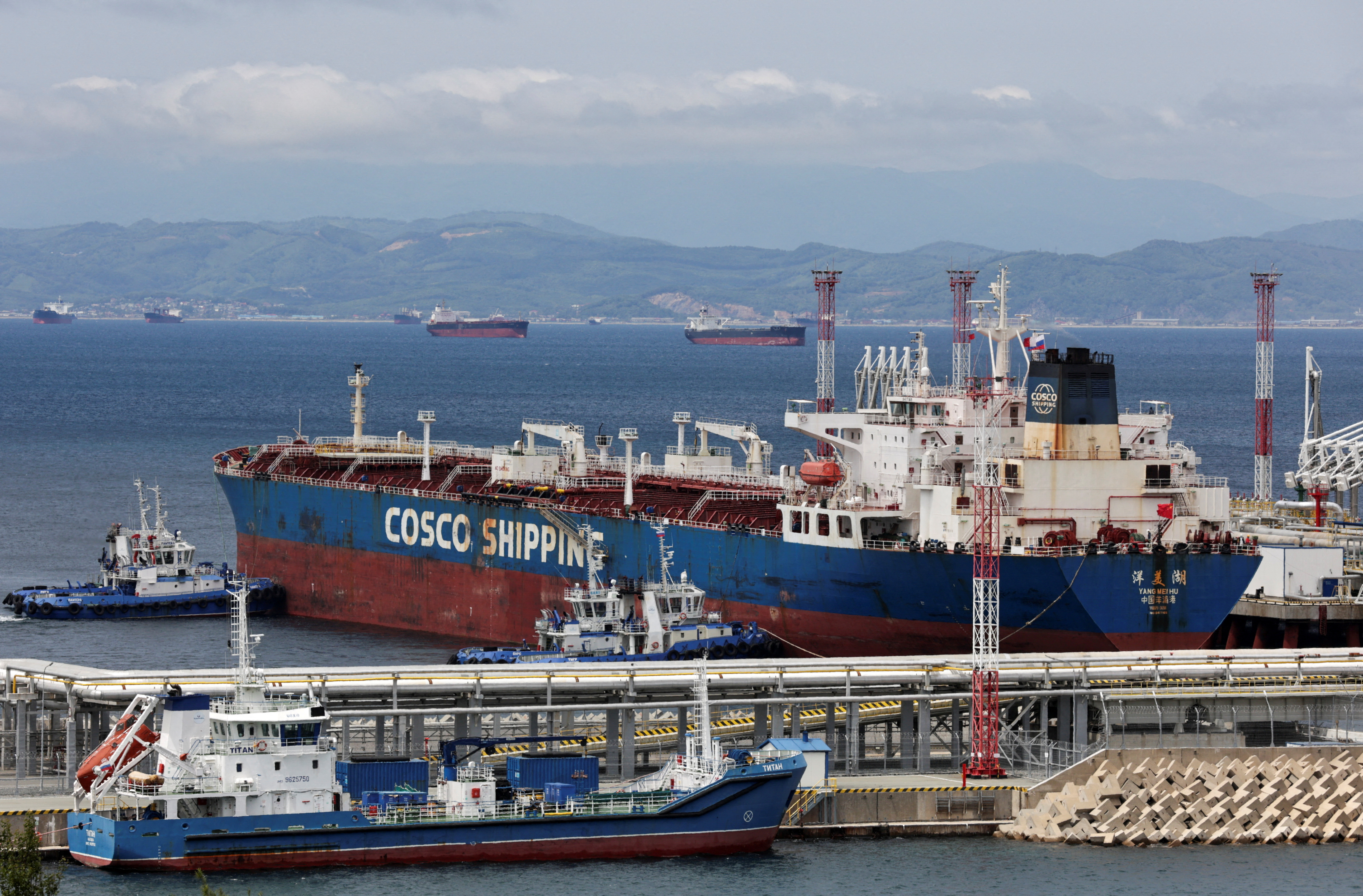Crimping the Russian Revenue Faucet Fueling Ukraine Conflict
"We want to go more into the details. ... We want to make sure that the goal is to target Russia and not to make our life more difficult.""We need to have a clear common understanding about what are the direct effects and what could be the collateral consequences."Charles Michel, head, European Union council of governments"At current prices, this entails massive profits for the Kremlin.""Should the G7 agree on a price cap for Russian oil, that would be a very important step to limit Putin's windfall revenues."Simone Tagliapietra, energy policy expert, Bruegel think tank, Brussels
 |
| U.S. President Joe Biden meets with German Chancellor Olaf Scholz, French President Emmanuel Macron, Italian Prime Minister Mario Draghi and British Prime Minister Boris Johnson alongside the G7 leaders summit at Bavaria's Schloss Elmau, near Garmisch-Partenkirchen, Germany June 28, 2022. REUTERS/Jonathan Ernst |
The
leaders of the world's largest developed economies are exploring any
and all options to continue to bring economic, political and social
pressure to bear on Russia in hopes of finally breaking the back of the
violently aggressive bear that is pulverizing Ukraine, leaving its towns
and cities in smouldering ruins, creating millions of displaced people,
killing thousands of innocent civilians to satisfy Russia's rage over
an implacably determined neighbour that sees its future with the West,
struggling to leave the Kremlin's orbit.
Vladimir
Putin's pretext of concern over the salvation of Ukrainians from the
stranglehold of fascism that Ukraine's leaders purportedly exert on the
country, evidenced by its drive toward EU and NATO membership is thin
gruel as an explanation for mounting a violent invasion of its neighbour
no matter how the issue is dressed in terms of ideology and the
camouflage of Russian predation of territories that comprise part of
Ukraine's vast land holdings.
The
Group of Seven summit in Germany has discussed practical, workable
methods to reduce Russia's income from its sale of energy products,
profiting Russia's tremendous financial outlay to prosecute its conflict
in Ukraine. The functionality of a price cap tied to services allied to
trading in Russian oil and gas would see insurers barred from dealing
with shipments above the cap. Service providers based largely in the EU
and UK would see Russia finding it difficult to source large-scale
workarounds.
Price
limitations are foreseen to reduce the income the Kremlin now accesses
from oil and gas and affect inflation in energy costs for consuming
countries reliant on Russian energy. The plan would rely as well on
countries in Asia agreeing to accept such a price cap. Another issue is
enforcement as well as caution around potential side-effects. 90 percent
of Russian oil reaches the EU by ship, an embarrassment to the EU which
has relied heavily on Russian oil and gas.
There
are warnings from economists that to proceed with such a plan there is a
possibility of a recession being triggered in Europe. Recovering demand
from the COVID pandemic and global markets hungry for energy are
additional constraints that could hamper the plan. Although Russia is
selling less oil to Western countries and diminishing its gas exports,
it has seen no fall in revenues given the atmosphere of rising prices
erasing the loss to state finances.
Russia,
according to Western officials, has used its energy as a weapon to
penalize the countries in Europe that have isolated it and applied
crippling sanctions, by delivering less gas, for example, than
contracted for. Moscow's success in replacing its European importers
with willing replacement buyers in China and India has helped Russia out
in its income dilemma.
The
new import arrangements in Asia sees India importing Russian crude and
refining it, then selling it on the international market where Russian
oil refined into gasoline or blended with other crude makes it difficult
to determine its source. Countries hungry for energy have no
inclination to delve into the issue of the finished product's origins,
and that includes the United States, buying India's refined products
which originated in Russian crude.
 |
| Yang Mei Hu oil products tanker owned by COSCO Shipping gets moored at the crude oil terminal Kozmino on the shore of Nakhodka Bay near the port city of Nakhodka, Russia June 13, 2022. REUTERS/Tatiana Meel/File Photo |
Labels: Economy Energy Exports, G7, Price Caps, Russian Invasion of Ukraine, Sanctions

<< Home